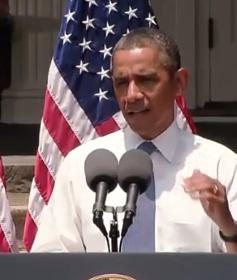 President Obama’s speech at Georgetown University was a milestone on climate change. It is a milestone in two ways. First, he made it clear he is not afraid to tackle coal as the primary culprit in climate change. Second, he made a major pivot in how he framed the Keystone XL pipeline debate. He’s no longer talking about “energy security” or “jobs” when talking about the pipeline but instead linking “our national interest” with whether or not the pipeline would have a significant impact on the changing climate.
President Obama’s speech at Georgetown University was a milestone on climate change. It is a milestone in two ways. First, he made it clear he is not afraid to tackle coal as the primary culprit in climate change. Second, he made a major pivot in how he framed the Keystone XL pipeline debate. He’s no longer talking about “energy security” or “jobs” when talking about the pipeline but instead linking “our national interest” with whether or not the pipeline would have a significant impact on the changing climate.
Virtually all climate scientists who have weighed in on the Keystone XL pipeline agree that tar sands oil, if exploited, would result in a net increase in greenhouse gas emissions. NASA’s former top scientist, James Hansen, said it would be “game over” for the climate if the pipeline went forward.
But more significantly, Obama signaled in this speech that he is ready to use his executive authority, and not willing to compromise on two key things: the climate impacts of coal and tar sands.
He made a major pronouncement in stating that public financing of coal should end, such as financing via agencies such as U.S. Export-Import Bank.
The Institute for Policy Studies was the first organization, together with Friends of the Earth, to document the significant climate impacts of U.S. Export-Import Bank and Overseas Private Investment Corporation’s fossil fuel investments in 1998. That research resulted in a lawsuit filed by Friends of the Earth, Greenpeace, and the City of Boulder challenging both of those public financial institutions with violations under the National Environmental Protection Act, for not calculating the cumulative emissions of their projects on the global climate. Obama’s statement today takes that research and legal action one step further and calls for an end to almost all U.S. government funding of coal overseas. The White House statement released today says:
“…The President calls for an end to U.S. government support for public financing of new coal plants overseas, except for (a) the most efficient coal technology available in the world’s poorest countries in cases where no other economically feasible alternative exists, or (b) facilities deploying carbon capture and sequestration technologies. As part of this new commitment, we will work actively to secure the agreement of other countries and the multilateral development banks to adopt similar policies as soon as possible.”
While this statement allows for some wiggle room on coal – if the carbon produced from the coal can be captured, which currently is not financially or technically feasible – it would eliminate U.S.  backing of coal financing in countries like India and South Africa, both of which have recently received billions of public dollars for massive coal-fired coal plants.
backing of coal financing in countries like India and South Africa, both of which have recently received billions of public dollars for massive coal-fired coal plants.
Obama also said he would encourage developing countries to transition to natural gas as they move away from coal, a posture consistent with what he is calling for at home. Such a statement is unfortunate as it encourages the expansion of fracking on U.S. lands, which results in fugitive methane emissions, water contamination, and health problems for nearby communities. The low price of natural gas, while welcome as a replacement for coal, is making truly clean and renewable energy less attractive financially.
Obama also continues to support nuclear power – a surprising posture in the aftermath of the Fukushima nuclear meltdowns, a disaster that is transforming Japan, causing it to shut down its nuclear power plants and replace them with renewable energy.
And Obama was unafraid to call out the climate deniers – the “flat earth society” – and shame them, while urging the public to “invest, divest,” a statement sure to warm the hearts of students and faith groups across the country, who are urging their institutions to divest their endowments of fossil fuels.
But the significance of this speech is that Obama is finally showing us he is willing to fight – on coal, on tar sands, and on climate. Obama remains an “all of above” champion who believes he can simultaneously frack and drill our country’s oil and gas resources and solve the climate crisis. But his apparent feistyness and willingness to challenge the climate impacts of coal and tar sands – after years of silence on both topics – is cause for some celebration.